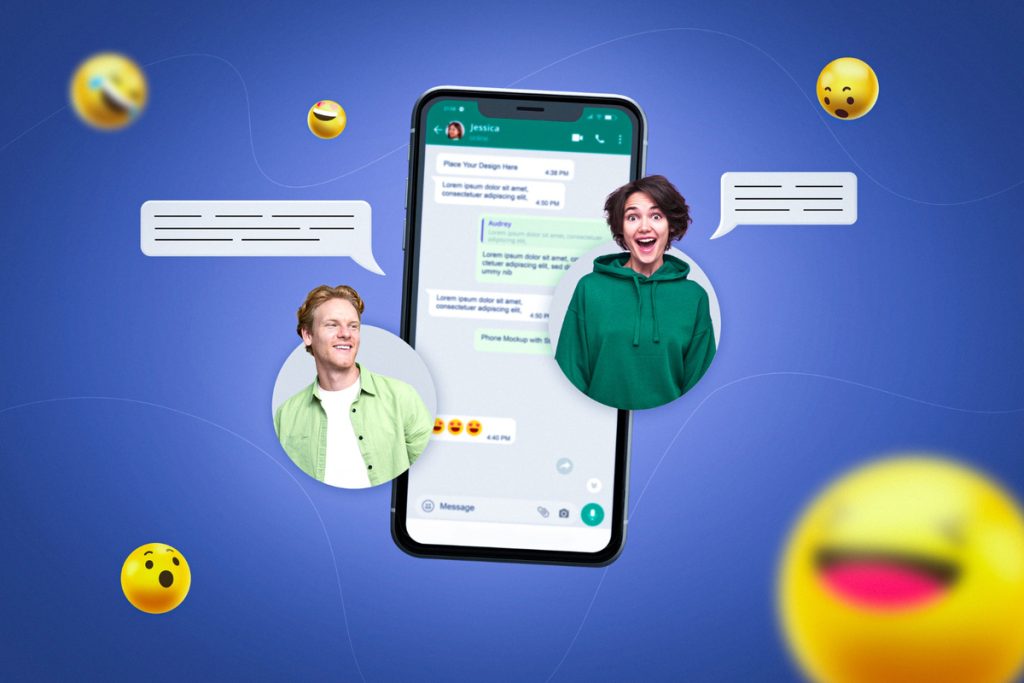WhatsApp has become a ubiquitous tool for personal and business communication in Malaysia, where mobile penetration rates are among the highest in Southeast Asia. With 13.8 million active users, WhatsApp offers businesses a direct channel to engage with their audience in real-time, fostering deeper connections and driving customer loyalty. Its seamless interface and end-to-end encryption reassure users about privacy, making it an attractive platform for businesses to deliver personalised marketing messages and customer support.

Getting Started with WhatsApp Marketing
Choosing the right WhatsApp platform depends on business size, operational needs, and budget considerations, ensuring scalability and efficiency in managing customer communications.
Explore two types of WhatsApp Business to find the ideal fit:
| Comparisons | WhatsApp Business App | WhatsApp Business API |
| Target Audience | SMEs (Small and Medium Enterprises) | Larger enterprises |
| Cost | Free | Subscription fee required |
| Integration | Standalone application | Requires integration with CRM systems and third-party service provider |
| Features | – Business profile creation – Location – Contact info – Operating hours – Quick replies – Automated greeting messages | – Automation of messages – Transactional notifications – Detailed analytics – Ability to message large audiences |
| Benefits | – Essential tools for managing customer interactions – Easy setup and use – Quick reply and greeting features enhance customer service efficiency | – Scalable for large audiences – Detailed analytics provide insights – Integration with CRM enhances automation capabilities |
| Drawbacks | – Limited scalability for very large businesses – Basic analytics and reporting capabilities | – Requires technical integration – Subscription fee adds to operational costs |
Building a Quality Audience on WhatsApp
Building a quality audience on WhatsApp begins with obtaining explicit consent from users to receive messages, adhering to Malaysia’s Personal Data Protection Act (PDPA). This not only ensures compliance with PDPA regulations but also establishes trust with your audience.
Here are some of the strategies to build a quality audience:
- Opt-in Mechanisms: Implementing clear opt-in forms across various touchpoints, such as websites, social media, and physical locations, is vital. This approach not only helps with compliance but also builds a permission-based contact list of engaged users who are more likely to respond positively to your messages.
- Segmentation: Segmenting your audience based on demographics, behaviours, or purchase history allows for more personalised messaging. You can enhance engagement and relevance by tailoring your messages to specific audience segments. For example, sending different messages to new customers versus returning customers can improve response rates and customer satisfaction.
- Personalisation: Personalising your communications based on the segmentation data further enhances engagement. Addressing recipients by their names, referencing past interactions or preferences, and sending targeted offers can significantly increase the effectiveness of your WhatsApp campaigns.
- Feedback and Iteration: Continuously collect feedback from your audience through surveys, polls, or direct messages. Use this feedback to refine your audience segments and messaging strategies over time, ensuring your WhatsApp marketing efforts remain effective and resonate well with your audience.

By focusing on these strategies, businesses can build a robust WhatsApp audience in Malaysia that not only complies with regulations but also drives engagement and delivers value to recipients. This approach lays a solid foundation for successful WhatsApp marketing campaigns that yield positive results.
Creating Compelling Content for WhatsApp
Tailoring content on WhatsApp to Malaysian cultural preferences and consumer behaviours involves several strategic approaches:
- Incorporating Localised and Seasonal Content: Malaysian society is diverse, comprising various ethnic groups and cultures. Incorporating local languages such as Malay, Chinese, and Tamil, along with cultural references and traditions, can resonate deeply with different segments of the population.
For instance, creating content that acknowledges and celebrates festivals like Hari Raya Aidilfitri, Chinese New Year, Deepavali, and Christmas can establish a strong cultural connection with audiences.
- Multimedia Engagement: In a digital landscape where attention spans are short, leveraging multimedia content is essential. Images, videos, and infographics not only enhance the visual appeal of messages but also convey information more effectively.
For example, sharing a video showcasing a local tradition or using infographics to highlight seasonal promotions can capture audience attention and encourage engagement.
- Interactive and Engaging Formats: Beyond static content, incorporating interactive elements such as polls, quizzes, and contests can encourage active participation from users. These formats not only drive interaction but also provide valuable insights into consumer preferences and behaviours.
For instance, conducting a poll about preferred product features or hosting a quiz related to local trivia can foster engagement and build brand affinity.
- Personalisation and Relevance: Understanding consumer interests and expectations is key to crafting relevant content. Personalising messages based on consumer data and behaviour ensures that communications resonate with recipients. This approach not only enhances engagement but also increases the likelihood of conversions by delivering content that meets specific consumer needs and interests.
By adopting these strategies, businesses can effectively tailor their WhatsApp content to Malaysian audiences, fostering deeper connections, driving engagement, and ultimately achieving marketing objectives more effectively in the dynamic Malaysian market.

WhatsApp Business Features
Personalising interactions based on customer history and preferences strengthens relationships, fosters positive brand perception and drives repeat business. WhatsApp offers several features to optimise marketing efforts and engagement:
- Broadcast Lists: Send personalised messages to multiple recipients while maintaining individualised communication, which enhances message relevance and recipient engagement.
- WhatsApp Status: Leverage status updates for real-time promotions, product launches, or limited-time offers and capitalise on the ephemeral nature of content to create urgency and exclusivity.
- WhatsApp Groups: Create community-driven groups that foster customer interaction, feedback, and loyalty. Groups are ideal for conducting polls, sharing exclusive content, and facilitating customer support discussions.
- Auto Message Sender: Automatically send bulk messages to prospects with random- delays to mimic natural messaging patterns and reduce spam risks.
- Video Tutorial & Support Group: Access video tutorials and join a support group for assistance and sharing best practices.
- Direct Reply Message: Reconnect with previous chat contacts without saving their information first, simplifying follow-ups.
- Extract Contact: Extract WhatsApp contacts into a target list for automated messaging and easy selection.
- Extract Group Contact: Extract group member contacts and save them in CSV format for easy data management.
- Auto Create Group and Invite Members: Automatically create WhatsApp groups and invite members from your contacts to streamline group management.
- Multi Content Message: Send messages with text, images, audio, or a combination, enhancing engagement with multimedia content.
- Live Auto Update: Receive minor updates automatically without reinstalling the application, ensuring continuous productivity.
- Chatbot Integration: Deploy AI-driven chatbots for handling routine queries and providing instant responses, improving efficiency and accessibility and ensuring round-the-clock support.

By leveraging these WhatsApp marketing features strategically, businesses can cultivate a dynamic and interactive presence on WhatsApp, enhancing brand visibility and customer engagement. Discover more about the WhatsApp Business strategies here.
Measuring Success: Analytics and Metrics
Key performance indicators (KPIs) help assess the impact and effectiveness of WhatsApp marketing efforts:
Message Open Rates: Monitoring the percentage of messages opened by recipients to provide insights into campaign reach and engagement levels.
Click-through Rates (CTR): Tracking user interaction with links or calls-to-action within messages gauges campaign effectiveness in driving conversions.
Conversion Rates: Analysing the number of recipients who take desired actions, such as making a purchase or signing up for a promotion, measures campaign ROI and effectiveness.
Utilising analytics tools and platforms enables businesses to refine strategies, optimise campaign performance, and maximise ROI from WhatsApp marketing initiatives.

WhatsApp Marketing Pricing in Malaysia
Understanding the cost dynamics of WhatsApp marketing in Malaysia is crucial for effective budgeting and maximising ROI. Here’s an in-depth look at the key pricing components:
WhatsApp Business API Costs
In Malaysia, pricing for the WhatsApp Business API typically ranges from RM0.09 to RM0.41 per business-initiated conversation. Costs vary based on message volume and agreements with service providers.
Check out Newnormz’s WhatsApp blasting service price in Malaysia here.
Budgeting and Optimisation Strategies for WhatsApp Marketing
Understanding and strategically managing WhatsApp marketing costs empowers businesses to effectively engage customers, boost sales, and foster brand loyalty in the Malaysian market.
To manage WhatsApp marketing expenses effectively, you can employ these strategies:
- Evaluate Service Providers: Compare pricing structures and features offered by different WhatsApp Business API providers to align with your business needs and budget.
- Monitor Usage and Analytics: Use analytics tools to track message delivery, open rates, and conversion metrics. This data provides insights into campaign effectiveness and justifies investment in WhatsApp marketing.
- Strategic Messaging: Tailor message content and timing to resonate with local preferences and seasonal trends, enhancing campaign efficiency.
Conclusion
WhatsApp marketing presents a powerful platform for businesses in Malaysia to connect with consumers on a personal level, drive engagement, and achieve business objectives. By implementing strategic approaches tailored to local preferences, leveraging WhatsApp’s features effectively, and adhering to regulatory guidelines, businesses can foster meaningful relationships and capitalise on the platform’s potential for marketing success. With continuous optimisation and innovation, WhatsApp remains a valuable tool for driving growth and enhancing brand presence in Malaysia’s evolving digital ecosystem.






